2019-2020年高二英语暑期作业复习方法策略15讲第10讲非谓语动词的5种题型设计及3种解题方法
高中英语非谓语的知识点总结

高中英语非谓语的知识点总结高中英语非谓语的知识点总结非谓语是指除了动词原形和动词不定式之外的动词形式,包括分词和动名词。
高中英语非谓语在英语学习中扮演着重要的角色,掌握非谓语的基础知识能够帮助我们更加深入地了解英语,也能够提升我们的英语表达能力。
本文将从非谓语的形式、用途以及常见的四种非谓语形式等方面进行总结。
一、非谓语的形式非谓语包括动名词、现在分词、过去分词和不定式。
1. 动名词动名词是由动词加上-ing构成。
动名词可作主语、宾语、表语、宾语补足语和定语等。
例如:- Swimming is good for health. 游泳对健康有益。
- He enjoys reading books. 他喜欢看书。
- My favorite hobby is playing basketball. 我最喜欢的爱好是打篮球。
- She found him sleeping on the sofa. 她发现他在沙发上睡觉。
- The man who is wearing a hat is my uncle. 戴帽子的那个男人是我的叔叔。
2. 现在分词现在分词是由动词加-ing构成。
现在分词可作定语、表语、状语等。
例如:- She saw a man smoking outside. 她看到一个男人在外面吸烟。
- The book is interesting and worth reading. 这本书很有趣,值得一读。
- Running late, she took a taxi to the airport. 她来不及了,就乘坐了出租车去机场。
3. 过去分词过去分词是由动词的过去分词形式构成。
过去分词可作定语、表语、宾语补足语、完成时和被动语态等。
例如:- She saw a broken mirror in the box. 她在盒子里看到一面破镜子。
- She seemed to be frightened by the noise. 她似乎被噪音吓到了。
高中英语知识点归纳非谓语动词和谓语动词的形式及用法对比

高中英语知识点归纳非谓语动词和谓语动词的形式及用法对比高中英语知识点归纳:非谓语动词和谓语动词的形式及用法对比在英语语法中,动词是一项重要的内容。
除了谓语动词,还有非谓语动词。
非谓语动词与谓语动词在形式和用法上有一些区别。
本文将对这两种类型的动词进行比较和总结。
一、非谓语动词的形式非谓语动词包括动词不定式、动名词和分词。
下面将分别介绍它们的形式。
1. 动词不定式动词不定式的一般形式为“to + 动词原形”。
例如:- to study(学习)- to eat(吃)- to go(去)2. 动名词动名词的一般形式为“动词的-ing 形式”。
例如:- studying(学习)- eating(吃饭)- going(去)3. 分词分词有两种形式:现在分词(-ing 形式)和过去分词(-ed 或 -en 形式)。
例如:- studying(正在学习)- eaten(被吃掉的)- broken(被打破)二、非谓语动词的用法非谓语动词在句子中可以充当多种不同的成分,下面将分别介绍它们的用法。
1. 动词不定式的用法- 作主语:To study is important.(学习很重要。
)- 作宾语:I want to eat an apple.(我想吃一个苹果。
)- 作补语:His goal is to win the championship.(他的目标是赢得冠军。
)- 作定语:We need a pen to write.(我们需要一支笔来写字。
)- 作状语:She woke up early to catch the train.(她早早醒来以赶上火车。
)2. 动名词的用法- 作主语:Studying is important.(学习很重要。
)- 作宾语:I enjoy listening to music.(我喜欢听音乐。
)- 作补语:Her hobby is singing.(她的爱好是唱歌。
)- 作定语:I saw a flying bird.(我看到一只在飞的鸟。
【高二学习指导】高二英语非谓语动词专讲及练习
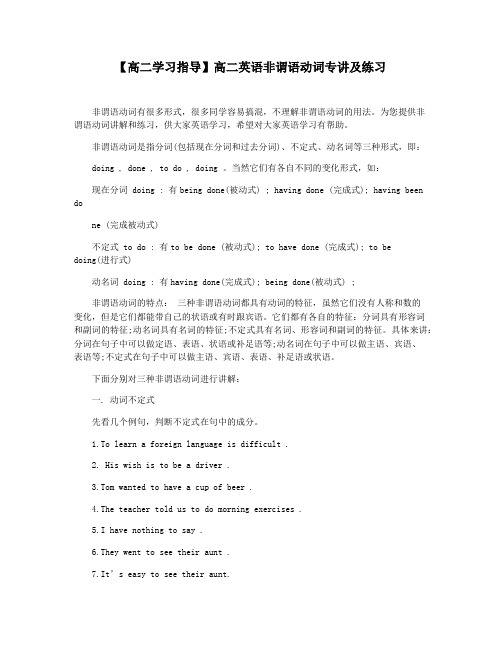
【高二学习指导】高二英语非谓语动词专讲及练习非谓语动词有很多形式,很多同学容易搞混,不理解非谓语动词的用法。
为您提供非谓语动词讲解和练习,供大家英语学习,希望对大家英语学习有帮助。
非谓语动词是指分词(包括现在分词和过去分词)、不定式、动名词等三种形式,即:doing , done , to do , doing 。
当然它们有各自不同的变化形式,如:现在分词 doing : 有being done(被动式) ; having done (完成式); having been done (完成被动式)不定式 to do : 有to be done (被动式); to have done (完成式); to bedoing(进行式)动名词 doing : 有having done(完成式); being done(被动式) ;非谓语动词的特点:三种非谓语动词都具有动词的特征,虽然它们没有人称和数的变化,但是它们都能带自己的状语或有时跟宾语。
它们都有各自的特征:分词具有形容词和副词的特征;动名词具有名词的特征;不定式具有名词、形容词和副词的特征。
具体来讲:分词在句子中可以做定语、表语、状语或补足语等;动名词在句子中可以做主语、宾语、表语等;不定式在句子中可以做主语、宾语、表语、补足语或状语。
下面分别对三种非谓语动词进行讲解:一. 动词不定式先看几个例句,判断不定式在句中的成分。
1.To learn a foreign language is difficult .2. His wish is to be a driver .3.Tom wanted to have a cup of beer .4.The teacher told us to do morning exercises .5.I have nothing to say .6.They went to see their aunt .7.It’s easy to see their aunt.8.I don’t know what to do next .9.I heard them make a noise .说明:1.动词不定式作主语, 2.动词不定式作表语,3.动词不定式作宾语,4.动词不定式作宾语补足语,5.动词不定式作定语,6.动词不定式作目的状语,7.动词不定式作真正主语,it 代替动词不定式,作形式主语。
高中英语知识点归纳非谓语动词的形式与用法技巧

高中英语知识点归纳非谓语动词的形式与用法技巧高中英语知识点归纳:非谓语动词的形式与用法技巧介绍:非谓语动词是英语语法中一个重要的概念,它可以作为动词的其他形式出现在句子中,除了主要动词之外。
在高中英语学习过程中,掌握非谓语动词的形式与用法技巧对于正确理解和运用英语语法非常重要。
本篇文章将归纳总结非谓语动词的基本形式及其常用的用法技巧,帮助读者更好地掌握这一知识点。
一、非谓语动词的基本形式非谓语动词包括不定式、动名词和现在分词。
它们的形式如下:1. 不定式:to + 动词原形(例如:to go)2. 动名词:动词原形 + -ing(例如:going)3. 现在分词:动词原形 + -ing(例如:going)二、非谓语动词的用法技巧下面将分别介绍不定式、动名词和现在分词的用法技巧。
1. 不定式的用法技巧:(1)作为主语:不定式作为主语时,常用it作形式主语,而将真正的主语放在不定式的后面。
例如:It is important to learn English well.(学好英语很重要。
)(2)作为宾语:动词后接不定式作为宾语时,不定式可以用于表示意图、目的、愿望、能力等。
例如:I want to go shopping.(我想去购物。
)(3)作为状语:不定式可作为状语修饰动词、形容词或副词,常表示目的、结果、原因等。
例如:He ran fast to catch the bus.(他快跑着去赶公共汽车。
)2. 动名词的用法技巧:(1)作为主语:动名词作为主语时,常用单数形式,并与动词以及代词的第三人称单数形式连用。
例如:Swimming is a good sport.(游泳是一项好运动。
)(2)作为宾语:动词后接动名词作宾语时,常与动词不定式有一定的区别,如愿望、计划、避免等。
例如:I enjoy playing basketball.(我喜欢打篮球。
)(3)作为介词宾语:动名词可作为介词的宾语,常见的介词有:for, of, about, with等。
高中英语知识点归纳非谓语动词的用法和形式

高中英语知识点归纳非谓语动词的用法和形式高中英语知识点归纳:非谓语动词的用法和形式非谓语动词是指在句中作主语、宾语、表语、定语或状语,且不具备人称和数的变化的动词形式。
高中英语中非谓语动词主要包括不定式、动名词和分词。
这些非谓语动词在句子中具有各自的用法和形式,下面将对它们进行归纳介绍。
一、不定式(Infinitive)1. 基本形式:to + 动词原形例:to go (去), to eat (吃)2. 作主语:- It is + adj. / n. + (for sb.) + to + 不定式例:It is important for us to learn English well. (学好英语对我们很重要)- To do + 动词原形 + 是不定式作主语时的常用句型例:To err is human, to forgive divine. (犯错是人之常情,宽容则是神圣的)3. 作宾语:- 动词 + 宾语 + 不定式例:I want to study abroad. (我想出国留学)- 动词 + 宾语 + 不定式的几个常见动词:want, plan, hope, expect, decide, try, learn, ask, tell, invite, encourage, order, allow, forbid等。
4. 作表语:- 主语 + be + adj. + 不定式例:His dream is to become a doctor. (他的梦想是成为一名医生)5. 作定语:- 不定式作定语通常放在被修饰的名词之后,常用逗号和其他修饰成分隔开例:He is a person, ready to help others. (他是一个乐于助人的人)6. 作状语:- 表目的:in order to / so as to + 动词原形例:He studies hard in order to pass the exam. (他努力学习为了通过考试)- 表结果:too + adj. / adv. + (for sb.) + to + 动词原形例:The box is too heavy for me to lift. (这个盒子对我来说太重,搬不动)二、动名词(Gerund)1. 基本形式:动词原形 + -ing例:going (去), eating (吃)2. 作主语:- 动名词作主语时,通常用单数形式例:Playing football is his hobby. (踢足球是他的爱好)3. 作宾语:- 介词 + 动名词例:I am good at playing chess. (我擅长下棋)4. 作表语:- 主语 + be + 动名词例:His hobby is collecting stamps. (他的爱好是收集邮票)5. 作定语:- 动名词作定语通常放在被修饰的名词之前例:I saw a running dog in the park. (我在公园见到一只奔跑的狗)6. 作状语:- 表目的:动名词前面加介词for或动名词短语例:He practices playing the piano every day for improvement. (他每天练习弹钢琴以提高)三、分词(Participle)分词根据用法和形式的不同,分为现在分词和过去分词。
高二英语复习方法技巧
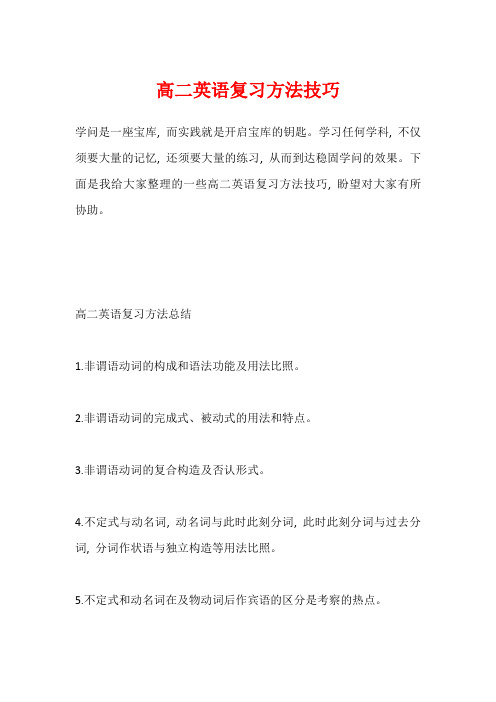
高二英语复习方法技巧学问是一座宝库, 而实践就是开启宝库的钥匙。
学习任何学科, 不仅须要大量的记忆, 还须要大量的练习, 从而到达稳固学问的效果。
下面是我给大家整理的一些高二英语复习方法技巧, 盼望对大家有所协助。
高二英语复习方法总结1.非谓语动词的构成和语法功能及用法比照。
2.非谓语动词的完成式、被动式的用法和特点。
3.非谓语动词的复合构造及否认形式。
4.不定式与动名词, 动名词与此时此刻分词, 此时此刻分词与过去分词, 分词作状语与独立构造等用法比照。
5.不定式和动名词在及物动词后作宾语的区分是考察的热点。
6.过去分词作定语, 不定式和分词作宾语补足语的用法。
7.不定式标记to和介词to的用法判定等。
8.带to与不带to的不定式的用法及区分。
高二英语学习方法指导了解英语单词的构造汉字有偏旁部首, 英语单词也是有构造的据了解, 英语单词共有六十多万个, 这也不是肯定和全面的, 但是他们都是由一个活假设干戈词素组成, 词素就是用以构成一个词有意义的音节(比拟专业的说明)。
比方:progress,是由pro-,gress两局部组成, pro的意思是foward(向前),gress的意思是step(步)。
所以这个单词的意思是进步。
再比方:reconstruct,是由re-,con-,struct组成, re-表示again(再次),con-表示together(共同),struct表示build(建立),所以这个单词的意思是重建。
读音规那么记忆法记忆英语单词它就是遵照元音字母、元音字母组合、辅音字母及辅音字母组合在开音节和闭音节的读音规律记忆。
例如:ea发[i:]。
还有些固定的字母组合, 例如:ly发[li], ty发[ti]和各种前缀、后缀, 例如:a-, re-, un-, dis-, im-;-ed, -ing, -ly, -er, -or, -ful, -y等都有其比拟固定的发音。
驾驭了这些规那么, 记单词时就不必一个字母一个字母地记忆了。
高中英语非谓语动词知识点讲解

非谓语动词的注意事项
总之,非谓语动词是高中英语语法中的一个重要知识点,学生需要认真掌握其构成、形式 和用法,并注意时态、语态、逻辑主语等问题。同时,结合语境理解也是非常重要的,只 有这样才能正确理解和运用非谓语动词 五、非谓语动词的特殊用法
独立主格结构:在句子中,有时会出现一个非谓语动词与一个名词构成独立主格 结构的情况。例如:"Weather permitting, we will go out for a walk."(如果 天气允许,我们会出去散步。)中的"permitting"为现在分词形式,与"weather" 构成独立主格结构,表示条件
例如,"Seeing is believing."(眼见为实。) 中的逻辑主语为"seeing", 与句子中的主语保持一致
非谓语动词的注意事项
语境理解问题:在理解句子意思的基础上,才能正确判断非谓语动词的形 式和用法。例如,"She likes reading books."(她喜欢读书。)中的
"reading"为动名词形式,作为宾语。如果只是单纯地看这个句子,可能会 误认为"reading"是不定式形式作为宾补,但结合语境理解,可知 "reading"为动名词形式作为宾语
八、练习与巩固
➢ 为了更好地掌握非谓语动 词的用法,学生需要进行 大量的练习。可以通过阅 读、写作、翻译等方式来 巩固非谓语动词的用法。 同时,也可以通过做相关 练习题来加深对非谓语动 词的理解和掌握
非谓语动词的注意事项
➢ 总之,非谓语动词是高中 英语语法中的一个重要知 识点,学生需要认真掌握 其构成、形式和用法,并 注意时态、语态、逻辑主 语等问题。同时,结合语 境理解也是非常重要的, 只有这样才能正确理解和 运用非谓语动词。通过大 量的练习和巩固,学生可 以更好地掌握这一知识点 ,提高英语水平
高中英语非谓语动词用法详解及练习(含答案详解)

非谓语动词之五兆芳芳创作非谓语动词(一)——动词不定式动词不定式、分词(现在分词,过来分词)和动名词统称为非谓语动词.现代英语将现在分词和动名词合为一大类叫作v + ing形式.这些动词的形式不克不及在句中单独作谓语用,因而没有语法主语.但可以有逻辑主语.由于没有语法主语,也就不受人称和数的限定,因为不是谓语,也就没有时态和语态,但这些词仍能暗示动作和状态,所以仍有暗示与其他动词相对时间关系的形式.由于与其它词有逻辑上的主谓关系,因此也有暗示主、主动的形式,同时也有自己的宾语和状语,一起组成非谓语动词的短语(动词不定式短语,分词短语,动名词短语).动词不定式、过来分词及v-ing形式在句中均不克不及作谓语用,所以叫做非谓语动词.(一)动词不定式:动词不定式由“to+ 动词原形”组成,如:to study, to play,动词不定式虽然不克不及作谓语动词用,但仍留着动词的特征,它可以带有所需要的宾语或状语而组成动词不定式短语,如:to study hard, to play table tennis.1、动词不定式的形式变更:动词不定式有下列时态和语态的形式变更.2、动词不定式的根本用法:动词不定式能起名词、形容词和副词的作用,可在句中作主语、表语、宾语补足语、定语和状语用,如:(1)作主语:To help each other is good.(动词不定式作主语时,一般可用it作形式主语,而将作主语的动词不定式置于句末,如:It is good to help each other.(2)作表语:My job is to drive them to the power station every day. 动词不定式在系动词be之后作表语,与暗示未来时的be + 动词不定式结构有所区别,如:Our plan is to set up another middle school for the peasants’ children.我们的筹划是给农民子弟再成立一所中学.(句中的谓语动词为is,动词不定式to set up… 为表语,主语为plan,但plan其实不是动词不定式的逻辑主语,即动词不定式to set up所暗示的动作不是主语plan产生的.)We are to set up another middle school for the peasants’ children.我们将为农民的子弟再成立一所中学.(句中的are to set up整个结构为句中谓语,主语为we,同时也是动词不定式to set up所暗示的动作的逻辑主语,即动词不定式to set up所暗示的动作是由we产生的).(3)作宾语:①作及物动词的宾语,如:She wishes to be a musician.;②作某些形容词的宾语:可以有动词不定式为宾语的形容词一般有glad, sorry, afraid, pleased, determined, willing, eager, anxious, ready, sure等,如:I am determined to give up smoking.;③动词不定式一般不作介词的宾语,但动词不定式之前如有疑问词时,就可作介词的宾语,如:Can you give us some advice on what to do next?(4)作宾语补足语,如:Tell the children not to play on the street. 如果句中的谓语动词为see, hear, watch, notice, have, make, let等,作宾语补足语的动词不定式须将to省去,如:I saw a little girl run across the street.(5)动词不定式在句中作宾语,如带有宾语补足语时,须先用it 作形式宾语,而将该动词不定式后置,如:I don’t think i t right to do it that way.(6)作定语:动词不定式作定语时,须位于被其修饰的名词或代词之后,如:Is this the best way to help him? 和定语用的动词不定式如果是不及物动词,不定式前面就要用需要的介词,如:He is the man to depend on. 如果被不定式修饰的名词为place, time, way,不定式前面的介词,习惯上可以省去,如:The old man is looking for a quiet place to live.(7)作状语:动词不定式可以作下列的状语:①目的状语:Every morning he gets up very early to read English. 为了强调不定式暗示目的的作用,可在不定式前加in order to或so as to(以便或为了),但应注意in order to位于句首或句中均可,而so as to不克不及位于句首,如:She reads China Daily every day in order to (so as to) improve her English. 将暗示目的的不定式置于句首,也可强调目的的作用,如:To master a foreign language, one must work hard at it. ②结果状语:They lived to see the liberation of their home town.他们活到亲眼见到了他们故乡的解放.③too + 形容词或副词+ 动词不定式,暗示“足能…”的结果,如:You are old enough to take care of yourself now.3、复合结构不定式:由for + 名词(或代词宾格)+ 动词不定式即组成复合结构的动词不定式.其中for自己无意义.for前面的名词或代词是不定式的逻辑主语,这种不定式在句中可作主语、表语、宾语、定语或状语,如:It is very important for us to get everything ready for the harvest. 当作表语用的形容词暗示不定式的逻辑主语的性质或特征时,就用介词of而不必for引出不定式的逻辑主语,这些形容词一般有good, nice, kind, wise, silly, stupid, foolish, right, wrong, careless, impolite等,如:It is very kind of you to help him every day.4、疑问词+ 动词不定式:疑问代词和疑问副词后可加动词不定式组成不定式短语,在句中可作主语、表语或宾语,如:How to prevent them from swimming in this river is a problem.5、动词不定式的否认式:动词不定式的否认式是由not + 动词不定式组成,如:It’s wrong of you not to attend the meeting.6、动词不定式的时态形式所暗示的时间关系:(1)一般式:动词不定式一般式所暗示的动作是和谓语动词所暗示的动作同时产生,但在多数情况下,是在谓语动词所暗示的动作之后产生,如:We decided to plant more trees this spring.(其后),They often watch us play table tennis.(同时);(2)完成式:动词不定式完成式所暗示的动作产生在谓语动词所暗示的动作之前,如:I am sorry to have kept you waiting.(3)进行式:动词不定式进行式所暗示的动作正在进行中,并且与谓语动词所暗示的动作同时产生,如:She happened to be writing a letter in the room when I came in.7、动词不定式的主动语态用法:如果动词不定式的逻辑主语为这个不定式所暗示的动作的承受者时,不定式一般就用主动语态形式,如:What is to be done next hasn’t been deci ded yet.非谓语动词(二)——动词-ing形式(二)-ing形式:动词的-ing形式也是一种非谓语动词.-ing形式仍保存有动词的特征,可以带有其所需要的宾语或状语而组成-ing短语.1、-ing的形式:-ing有一般式和完成式.及物动词的-ing还有主动语态和主动语态,而不及物动词的-ing则没有主动语态.现在以及物动词make 和不及物动词go为例,将其-ing各类形式列表如下:2、-ing形式的根本用法.(1)作主语:Seeing is believing.百闻不如一见.Talking is easier than doing. –ing作主语时,如果其结构较长,可用it作形式主语,而将作主语的-ing后置.如:It isn’t much good writing to them again. It’s no use waiting here.(2)作表语:Her job is washing and cooking. My hobby is collecting stamps.(3)作宾语:①作及物动词的宾语.She likes drawing very much.;②作某些短语动词的宾语. Mary is thinking of going back to New York.;③do+限定词(my, some, any, the等)+ -ing,暗示“做…事”之意,如:We often do our cleaning on Saturday afternoon. Will you do any shopping on Saturday this afternoon? ④作介词的宾语:Her sister is good at learning physics.;⑤作形容词worth, busy等的宾语:This book is well worth reading. –ing作宾语带有宾语补足语时,要用it作为形式宾语,而将作宾语的-ing后置,如:We found it no good talking like that. Do you think it necessary trying again?(4)作定语:The sleeping child is only five years old. Do you know the man standing at the gate? 注:-ing形式作定语用时,如果-ing只是一个单词,就位于其修饰的名词之前,如果是-ing短语,就位于其修饰的名词之后,-ing作定语时,被-ing所修饰的名词就是该-ing的逻辑主语.另外,-ing作定语用时,其动作和句子谓语动词所暗示的动作是同时进行的,如果不是同时进行的,就不克不及用-ing作定语,要使用定语从句,如:The girl who wrote a letter there yesterday can speak English very well.(5)作宾语补足语:We can see steam rising from the wet clothes. 注:当-ing在复合宾语中作宾语补足语用时,句中宾语就是这个-ing的逻辑主语,可以带有这种复合宾语的动词有see, watch, hear, observe, feel, find, have, keep等.(6)作状语:①时间状语:Seeing Tom, I couldn’t help thinking of his brother. 分词在句中作时间状语时,其前一般可加when或while,如:When crossing street, you must be careful. ②原因状语:Being ill, he didn’t go to school yesterday. ③方法或陪伴状语:Mary stood at the school gate waiting for Betty.3、主动语态-ing完成式的根本用法.主动语态-ing完成式所暗示的动作产生在句中谓语动词所暗示的动作之前,一般在句中作时间或原因状语用.句中的主语是它的逻辑主语,并且是它所暗示的动作的执行者,如:Having answered the letter, she went on to read an English novel.4、主动语态-ing一般式的根本用法.主动语态-ing一般式所暗示的动作是一个正在进行中的主动动作,并且这个主动动作也是和句中谓语所暗示的动作同时产生的.它一般在句中作定语或状语用.如:The truck being repaired there is ours.5、主动语态-ing完成式的根本用法.主动语态-ing完成式所暗示的动作产生在谓语动词所暗示的动作之前,在句中一般作状语用.如:Havingbeen shown the lab, we were taken to see the library.6、-ing形式的复合结构.在-ing前加物主代词或名词所有格即组成-ing的复合结构.其中的物主代词或名词所有格为-ing的逻辑主语.这种结构在句中可作主语、宾语或表语,如:Your smoking and drinking too much will do harm to your health. 但在口语中,这种结构如作宾语用,其中的物主代词经常使用人称代词的宾格,名词的所有格经常使用名词的普通格代替,如:She insisted on Peter’s (or Peter)going there first.7、-ing形式与动词不定式在句中作主语、表语、宾语时的区别.一般说来,暗示一个比较抽象或泛指的动作时多用-ing形式.暗示一个具体某一次的动作时,多用动词不定式,如:Our job is making steel. She likes playing the piano, but she doesn't want to play it today.8、-ing形式与动词不定式在句中作定语的区别.-ing形式作定语用时,其动作一般与句中谓语动词所暗示的动词同时产生,而动词不定式作定语时,其动作一般产生在句中谓语动词所暗示的动作之后.如:The girl writing a letter there can speak English very well./I have three letters to write.9、-ing形式与动词不定式在作宾语补足语时的区别.(1)不定式作宾补时,其动作一般产生在谓语动词所暗示的动作之后,如:I have told them to come again tomorrow.(2)在see, watch, hear, feel等之后,如果用-ing形式作宾补,暗示其动作正在进行中,而用不带to的不定式作宾补时,不定式所暗示的动作是一个动作的进程,如:I hear her singing in the room.我听见她正在屋里唱歌. I hear her sing in the room.我听见她在屋里唱过歌.10、-ing形式与动词不定式在句中作状语的区别.-ing形式在句作状语暗示时间、原因、方法或陪伴情况,而动词不定式一般式在句中作状语时,一般是作目的或结果状语,如:Not receiving his letter, I wrote to him again./ I looked into the window to see what was going on inside.非谓语动词(三)——过来分词( 三)过来分词:1、过来分词的根本用法:过来分词只有一种形式,也没有主动语态,它所暗示的动作是一个主动的或是已完成的动作.过来分词在句中也可用作定语、表语、宾语或状语等成分.过来分词在句中作某种成分时,其逻辑主语一般为该分词所暗示的动作的承受者,如:(1)作定语:过来分词作定语时,如果这个分词是一个单词,就位于其修饰的名词之前,如果是分词短语,就位于其修饰的名词之后.被过来分词所修饰的名词,就是该分词的逻辑主语,如:The stolen car was found by the police last week.(2)作表语:过来分词作表语时,暗示其逻辑主语所处的状态,其逻辑主语就是句中的主语,如:The glass is broken.这个玻璃杯是破的. 注:过来分词作表语时,和动词的主动语态结构相似,但两者表达的意义不合,如:The glass was broken by my little brother.这个玻璃杯是被我小弟弟打破的.作表语用的过来分词在许多词典中已列为形容词,如:crowded, devoted, discouraged, done, dressed, drunk, experienced, frightened, gone, hurt, interested, killed, known, learned, lost, pleased, satisfied, shut, surprised, tired, undressed,worried, astonished, broken, completed, covered 等.(3)作宾语补足语:过来分词作宾语补足语时,句中的宾语就是其逻辑主语,如:When I opened the door, I found the ground covered by fallen leaves. 注:动词have后的复合宾语中,宾语补足语如为过来分词,常暗示该分词所暗示的动作是由他人来执行的而不是句中主语自己来执行的,如:I had my bike repaired yesterday. 昨天我(找他人)把我的自行车给修了.(4)作状语:过来分词作状语时,相当于一个状语从句,该结构的逻辑主语一般都是主句的主语,是过来分词所暗示意义的逻辑宾语.为了使作状语的过来分词意义加倍明确,常在分词前加when, if, while, though, as等连词,如:Seen from the hill/ When seen from the hill, our town looks beautiful.; Given more time/ If given more time, we could have done it better.(we是该结构的逻辑主语,是give的逻辑宾语.)独立主格:上述-ing和过来分词的用法中,-ing和过来分词在句中均有逻辑主语,但有时它们也能有自己的独立的主语,这种独立的主语,一般为名词或代词,位于其前之前,和-ing或过来分词组成独立主格.独立主格在句中一般只作状语用,而-ing和过来分词作用的形式,则要按照它们所暗示的动作和句中谓语动词所暗示的时间关系而定.至于独立主格中是使用-ing或是过来分词,则要按照它们的主语和其所暗示的动作的主动主动关系而定,如:The bell ringing, we all stopped talking. 注:The work having been finished, she sat down to have a rest. ①独立结构中的being或having been常可省去,如:The meeting (being) over, all left the room. ②作陪伴状语的独立结构常可用with短语来代替,如:She read the letter, tears rolling down her cheeks./ She read the letter with tears rollingdown her cheeks.2、-ing形式与过来分词的区别:(1)语态不合:-ing形式暗示主动概念,及物动词的过来分词暗示主动概念.an inspiring speech鼓舞人心的演说;the inspired audience受鼓舞的听众.(2)时间关系不合:现在分词所暗示的动作一般是正在进行中的动作,而过来分词所暗示的动作,往往是已经完成的动作,如:The changing world正在产生的世界;the changed world已经起了变更的世界.易错易混点1.疑问词+动词不定式:疑问代词和疑问副词后可加动词不定式组成不定式短语,在句中可作主语、表语或宾语,如:How to prevent them from swimming in this river is a problem.2.动词不定式的否认式:由not +动词不定式组成.3.v.-ing形式与动词不定式在句中作主语、表语、宾语时的区别.v.-ing形式:暗示抽象或泛指的动作.不定式:暗示具体某一次的动作.She likes playing the piano, but she doesn't want to play it today.4.v.-ing形式与动词不定式在句中作定语的区别.v.-ing形式:动作与谓语动词所暗示的动作同时产生.不定式:动作产生在谓语动词所暗示的动作之后.eg. The girl writing a letter there can speak English very well.I have three letters to write.5.v.-ing形式与动词不定式在作宾语补足语时的区别.(1)不定式作宾补时,其动作一般产生在谓语动词所暗示的动作之后,如:I have told them to come again tomorrow.(2)在see, watch, hear, feel等之后,如果用v.-ing形式作宾补,暗示其动作正在进行中,而用不带to的不定式作宾补时,不定式所暗示的动作是一个动作的进程,如:I hear her singing in the room. 我听见她正在屋里唱歌.I hear her sing in the room. 我听见她在屋里唱过歌.6.v.-ing形式与动词不定式在句中作状语的区别.v.-ing形式:暗示时间、原因、方法或陪伴情况.不定式:作目的或结果状语.7.v.-ing形式与过来分词的区别:(1)语态不合:v.-ing形式暗示主动概念,及物动词的过来分词暗示主动概念.an inspiring speech鼓舞人心的演说; the inspired audience受鼓舞的听众(2)时间关系不合:现在分词所暗示的动作一般是正在进行中的动作,而过来分词所暗示的动作,往往是已经完成的动作,如:the changing world正在变更的世界 the changed world已经变更了的世界8.独立主格结构:有时v.-ing和过来分词在句中也有自己的独立的主语,这种独立的主语一般为名词或代词,和v.-ing还有过来分词组成独立主格结构.该结构在句中一般只作状语. 独立主格中是使用v.-ing仍是过来分词,则要按照它们的主语和其所暗示的动作的主动或被动关系来定,如:The bell ringing, we all stopped talking.注意:①独立结构中的being或having been常可省去,如:The meeting_(being)_over, all left the room.②作陪伴状语的独立结构常可用with短语来代替,如:She read the letter, tears rolling down her cheeks.= She read the letter with tears rolling down her cheeks.非谓语的解题步调或思路(1)先判断空格部分所需的是主句,从句仍是非谓语动词.独立的句子,从句或非谓语独立的句子加句号,分号或破折号的话,后再加一个独立的句子.独立的句子,(逗号)有and,but, so 等词加独立的句子. (2)再按照主句的主语,来判断主动或主动;(3)接下来再判断时态,(4)如果是否认的话,not一定要放在非谓语的前面(5)一定不要忘记主语一致的原则,如果不一致的话,要把非谓语的独立主语加上.非谓语罕有的位置,或在句子中所担当的成分(1)非谓语动词短语, + 主句或是主句,非谓语动词短语这时的非谓语动词短语起到状语的作用例如: influenced by the growing interest in nature, more people enjoy outdaoor activities.在这种情况下,首先,找出主句的主语,然后以主句的主语为出发点,来判断非谓语动词是主动仍是主动,如果已有的非谓语动词的主语和主句主语不一致,还要考虑独立主格结构,也就是把非谓语动词的自己的主语加上去:例如: All flights having been cancelled , they decided to take the train. 其次,把非谓语动词和主句的动词比较,看是否同时产生仍是有明显的先后.(2)跟在介词,动词或某些形容词的前面固定搭配只接动词-ing形式而不接不定式作宾语的动词有:admit 承认 appreciate 感谢 avoid 避免 put off 推迟 keep 保持 consider 考虑 delay/ postpone 耽搁 dislike 嫌恶 resist 抵制 mention 提及 enjoy 喜欢 escape 避免 excuse 原谅 practice 练习 mind介意 fancy想不到 feel like 意欲 finish 完成 risk 冒险 include 包含 forgive 原谅 give up 保持 suggest 建议 miss 逃过 imagine 想象can’t help 情不自禁 involve 需要can’t stand 无法忍受 understand 理解罕有的带介词to的短语:be used to 习惯be related to 与……有关 get down to 着手做 contribute to 奉献put one’s mind to 全神灌输于 give rise to 引起 be equal to 胜任 devote oneself to 献身于lead to 导致 be opposed to 否决 look forward to 盼望 object to 否决stick to 保持 pay attention to 注意(3)介词后一定要加动词的-ing 形式;(4)跟在名词前面做定语时,一般不必having done/ having been done 结构(5)放在句首做主语,一般用动词的ing 和to do …特殊的非谓语短语 Generally speaking 一般来说Considering …. 考虑到,鉴于Time/weather permitting 时间、天气允许的话Taking …into account 考虑到Taking …into consideration 考虑到Provided …假设Providing…假设Suppose…假设Supposing…假设Judging from/ by…按照…判断Given sth 假设,如果;鉴于,考虑到Given that…假设,如果;鉴于,考虑到 including sth (sth included)包含某事非谓语动词根本练习1. He looked around and caught a man ______ his hand into the pocket of apassenger. A. put B. to be putting C. to put D. putting2. When you’re learning to drive, _______ a good teacher makes a big difference.A. haveB. havingC. and haveD. and having3. I felt it a great honor ______ to speak to you.A. to askB. askingC. to be askedD. having asked4. I would love _______ to the party last night but I had to work extra hours to finish a report.A. to goB. to have goneC. goingD. having gone5. Before you decide to leave your job, _______ the effect it will have on your family.A. considerB. consideringC. to considerD. considered6. Robert is said _______ abroad, but I don’t know what country he studie d in.A. to have studiedB. to studyC. to be studyingD. to have been studying7. It is said that in Australia there is more land than the government knows _______.A. it what to do withB. what to do it withC. what to do with itD. to do what with it8. Anyone _______ bags, boxes, or whatever, was stopped by the police.A. seen carryB. seen carryingC. saw to carryD. saw carrying9. Mr Reed made up his mind to devote all he had to _______ some schoolsfor poor children. A. set up B. setting up C. have set up D. having set up10. The discovery of new evidence led to _______.A. the thief having caughtB. catch the thiefC. the thief being caughtD. the thief to be caught11. She looks forward every spring to _______ the flower-lined garden.A. visitB. paying a visitC. walk inD. walking in12. To test eggs, _______ them in a bowl of water: if they float they’re bad, if they sink they’re good.A. putB. puttingC. to putD. to be putting13. “Where is David?”“He is upstairs ______ ready to go out.”A. to getB. gettingC. to be gettingD. having got14. “Mum, why do you always make me eat an egg every day?”“________ enough protein and nutrition as you are growing up.”A. GetB. GettingC. To getD. to be getting15. He was reading his book, completely _______ to the world.A. lostB. losingC. to loseD. to have lost16. We looked everywhere for the keys, but they are nowhere _______.A. to findB. to have foundC. to be foundD. being found17. The boy wanted to ride his bicycle in the street, but his mother told him _______.A. not toB. not to doC. not do itD. do not do18. A cook will be immediately fired if he is found _______ in the kitchen.A. smokeB. smokingC. to smokeD. smoked19. Finding her car stolen, _______.A. a policeman was asked to helpB. the area was searching thoroughlyC. it was looked for everywhereD. she hurried to a policeman for help20. “How do you deal with the disagreement between the company and the cus tomers?”“The key ______ the problem is to meet the demand ______ by the customers.”A. to solving, makingB. to solving, madeC. to solve, makingD. to solve, made21. “What do you think made Mary so upset?”“_______ her new bike.”A. As she lostB. LostC. LosingD. Because of losing22. The research is so designed that once _______ nothing can be done to change it.A. beginsB. having begunC. beginningD. begun23. Though ________ money, his parents managed to send him to university.A. lackedB. lacking ofC. lackingD. lacked in24. Tony was very unhappy for _______ to the party.A. having not been invitedB. not having invitedC. having not invitedD. not having been invited25. Though I have often heard this song _______. I have never heard you _______ it.A. being sung, sangB. sang, singingC. sung, singD. to be sung, to sing非谓语动词提高练习1. The great hall was crowded with many people, __ many children __on their parents’ lapA. including; seatedB. including; seatingC. included; satD. included; sitting2. It’s said that the Olympic Games _____ in Beijing in 2008 will cover more events than any other Olympics did.A. holdingB. to be heldC. heldD. to be holding3. _____ for a long time, most of the crops in this area died from lacking water.A. Being no rainB. There was no rainC. To be no rainD. There being no rain4. Yesterday a street-beggar bought a lottery ticket purposelessly, _____ hima millionaire overnight.A. makingB. makesC. to makeD. made5. In the face of the big fire in October in California, many people in the fire-stricken areas moved out _____.A. to escape burningB. to escape being burnedC. escaping burnedD. escaping from burning6. Taking this medicine, if _____, will of course do good to his health.A. continuedB. to continueC. continuesD. continuing7. The little boy still needs the _____ 20 dollars to do with some things _____.A. remaining; remained to be settledB. remaining; remaining to be settledC. remained; remained to settleD. remained; remaining to settle8. _____ his age, the little boy read quite well.A. ConsideringB. ConsideredC. ConsiderD. Having considered9. _____ from the appearance, it is very peaceful; but in fact, a war will break out soon.A. JudgedB. JudgingC. Having judgedD. To judge10. —Tom enjoys _____ basketball on Sunday afternoons, doesn’t he? —Yes, he does. But what his sister enjoys _____.A. to play; dancingB. playing; to danceC. to play; to danceD. playing; is to dance11. His letter, _____ to the wrong number, reached me late.A. having been addressedB. to have addressedC. to have been addressedD. being addressed12. The Space Shuttle Columbia broke into pieces over Texas as it returned tothe earth on February 1, 2003,_____ all seven astronauts aboard.A. having killedB. killingC. being killedD. killed13. There are lots of places of interest _____ in our city.A. needs repairingB. needing repairedC. needed repairingD. needing to be repaired14. — What caused the party to be put off? — _____ the invitations.A. Tom delayed sendingB. Tom’s delaying sendingC. Tom delaying to sendD. Tom delayed to send15. I was afraid _____ to my customers because I was afraid _____ them.A. of talking back; to loseB. of talking back; of losingC. to talk back; to loseD. to talk back; of losing16. Standing on the top of the hill, I would not do anything but _____ the flowing of the smog around me.A. enjoyB. enjoyingC. enjoyedD. to enjoy17. — Is Tom a good talker? — No, he never speaks to me other than _____ something?A. ask forB. to ask forC. asked forD. asking for18. I can’t get my car _____ on cold mornings, so I have to try _____ the radiator with some hot water.A. run; to fillB. running; fillingC. running; to fillD. ran; filling19. The drunken husband knocked against the table and sent the bowls _____ in all directions before he was sent _____ by his wife.A. flying; to sleepB. flying; sleepingC. to fly; to sleepingD. to fly; to sleep20. When we got back from the cinema, we found the lamp _____ but the door _____.A. being on; shutB. burning; shuttingC. burning; shutD. on; shutting21. We found the students seated at tables and had their eyes _____ on the scene of the launch of Shenzhou V spaceship.A. fixedB. fixC. fixingD. to fix22. A doctor can expect _____ at any hour of the day or night.A. callingB. to callC. being calledD. to be called23. The boy often gives a satisfactory answer to the teacher’s question, _____ just a minute. So he’s usually the teacher’s pet.A. thoughtB. having thoughtC. and to thinkD. thinking24. The policeman came up to the lonely house with the door ____, ____ there for a while and then entered it.A. open; to standB. opening; stoodC. open; stoodD. opened; standing25. _____ along the quiet road at forty miles an hour, and then an old man suddenly started to cross the road in front of me.A. DrivingB. I was drivingC. Having drivenD. When I was driving26. Mr. Smith was much surprised to find the watch he had had _____ was nowhere to be seen.A. repairingB. it repairedC. repairedD. to be repaired27. What did the librarian _____ out of the library?A. permit to takeB. forbid to be takenC. allow to takeD. insist being taken28. — Mum, why do you give me so much popcorn? — _____ the boring time.A. KillB. KillingC. To killD. Having killed29. What Yang Liwei wanted to do when he got out of the spaceship was __ the joy with all the Chinese.A. shareB. sharedC. having sharedD. about to share30. When she was alone at home, Mary needed a friend _____.A. playing withB. having played withC. with whom to play withD. with whom to play31. _____ the big snake, the little girl stood under the tree _____ out of life.A. Seeing; frightenedB. Seeing; frighteningC. Seen; frightenedD. To see; frightening32. The competitor never dreamed of _____ for him to win the first prize in the 100-meter race.A. there was a chanceB. there being a chanceC. it being a chanceD. it was a chance33. _____ everything to go wrong in advance, and you won’t feel quite so bad when it does.A. Having expectedB. ExpectC. To expectD. Expecting34. — You _____ part in the party on time. — Sorry, I was delayed by the accident.A. are to takeB. have supposed to takeC. were to have takenD. supposed to take 35. _____ with the size of the whole earth, the highest mountain doesn’t seem high at all.A. When comparedB. To compareC. While comparingD. It compared36. _____ in her best suit, the girl tried to make herself _____ at the party.A. Dressed; noticedB. Dressing; noticingC. Dressed; noticingD. Dressing; noticed37. The matter _____ your study surely requires _____ carefully.A. relating to; dealing withB. related to; dealt withC. related to; being dealt withD. relating to; having dealt with38. _____ made her parents worried a lot.A. Her not to come backB. Not her to come backC. Her not coming backD. Not her coming back39. Everything _____ into consideration, they believed themselves more and returned to their positions.A. to takeB. takenC. to be takenD. taking40. He moved away from his parents and missed them _____ enjoy the exciting life in New York.A. much so as toB. very much toC. too much toD. enough to41. — What do you think of the plan? —It’s easier said than _____.A. carried outB. carrying outC. carry outD. to carry out42. Many businessmen attended the Boao Forum (博鳌论坛)because they knew what _____ from the forum.A. to getB. to be gotC. gotD. getting43. There was a famous person at the party whom everyone would like _____to themselves. A. to introduce B. to be introduced C. introducingD. being introduced44. — Were you at home last Sunday? — Yeah! I devoted the whole day to _____ the English grammar.A. reviewB. reviewingC. be reviewedD. being reviewed45. Once _____ at the shop, you will be dismissed immediately.A. caught stealingB. caught to stealC. catching stealingD. to catch to steal46. Prices of daily goods _____ through a computer can be lower than store prices.A. are boughtB. boughtC. been boughtD. buying47. _____, John returned to school from his hometown.A. The summer vacation being overB. The summer vacation is overC. Because the summer vacation overD. After the summer vacation being over48. _____ she can’t come, who will do the work?A. SupposedB. SupposingC. Having supposedD. Being supposed。
专题3.非谓语动词-2020-2021学年英语新高二暑假衔接大串讲(人教版2019)
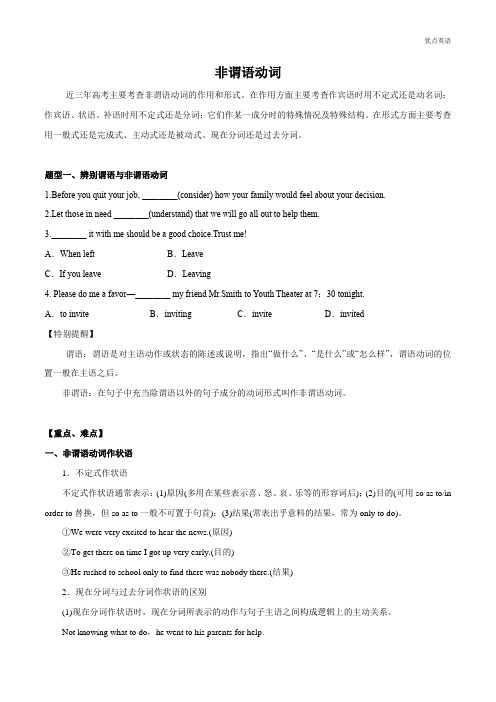
非谓语动词近三年高考主要考查非谓语动词的作用和形式。
在作用方面主要考查作宾语时用不定式还是动名词;作宾语、状语、补语时用不定式还是分词;它们作某一成分时的特殊情况及特殊结构。
在形式方面主要考查用一般式还是完成式、主动式还是被动式、现在分词还是过去分词。
题型一、辨别谓语与非谓语动词1.Before you quit your job, ________(consider) how your family would feel about your decision.2.Let those in need ________(understand) that we will go all out to help them.3.________ it with me should be a good choice.Trust me!A.When left B.LeaveC.If you leave D.Leaving4. Please do me a favor—________ my friend Mr.Smith to Youth Theater at 7:30 tonight.A.to invite B.inviting C.invite D.invited【特别提醒】谓语:谓语是对主语动作或状态的陈述或说明,指出“做什么”、“是什么”或“怎么样”,谓语动词的位置一般在主语之后。
非谓语:在句子中充当除谓语以外的句子成分的动词形式叫作非谓语动词。
【重点、难点】一、非谓语动词作状语1.不定式作状语不定式作状语通常表示:(1)原因(多用在某些表示喜、怒、哀、乐等的形容词后);(2)目的(可用so as to/in order to替换,但so as to一般不可置于句首);(3)结果(常表出乎意料的结果,常为only to do)。
①We were very excited to hear the news.(原因)②To get there on time I got up very early.(目的)③He rushed to school only to find there was nobody there.(结果)2.现在分词与过去分词作状语的区别(1)现在分词作状语时,现在分词所表示的动作与句子主语之间构成逻辑上的主动关系。
暑假作业 07 高二英语重点语法非谓语动词知识巩固及练2024年高二英语暑假培优练(人教版2019)

完成时间:月日天气:暑假作业 07 高二英语重点语法非谓语动词知识巩固及练习核心考点梳理非谓语动词的形式非谓语动词包含四种形式,即不定式、动名词、现在分词和过去分词。
其中,每种形式按照发生时间和主被动又包括不同的子形式。
具体如下:1. 不定式①基本形式:to do(表示主动,并且一般表示将来)②被动式:to be done(表示被动,并且一般表示将来)③进行式:to be doing (表示主动和进行)④完成时:to have done(表示主动和完成)⑤完成被动式:to have been done(表示被动和完成)⑥完成进行式:to have been doing (表示主动和完成进行)The teacher told us to do morning exercises. 老师让我们做早操。
The car to be bought is for his sister. 要买的这辆车是给他的姐姐的。
She pretended to be reading when the teacher came into the classroom. 老师进来时,她假装正在读书。
The thief is said to have escaped. 据说小偷已经逃跑了。
The thief is said to have been arrested. 据说小偷已经被抓住了。
She is said to have been working in the factory over the last 20 years. 据说在过去的20年里,她一直在这家工厂工作。
2. 动名词①基本形式:doing (表示主动)②被动式:being done(表示被动)③完成式:having done(表示主动和完成)④完成被动式:having been done(表示被动和完成)Travelling in space by ordinary people will be common in the future.在未来,普通人在太空旅行将会是普遍的事情。
高二英语暑假精品课(外研版2019选择必修1)非谓语动词
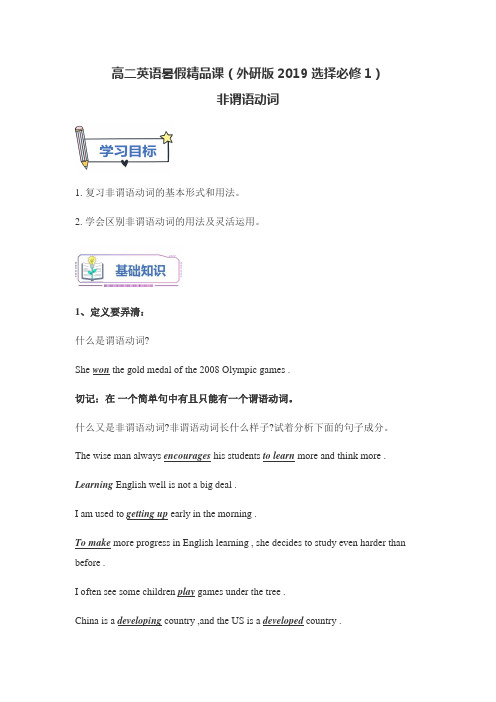
高二英语暑假精品课(外研版2019选择必修1)非谓语动词1. 复习非谓语动词的基本形式和用法。
2. 学会区别非谓语动词的用法及灵活运用。
1、定义要弄清:什么是谓语动词?She won the gold medal of the 2008 Olympic games .切记:在一个简单句中有且只能有一个谓语动词。
什么又是非谓语动词?非谓语动词长什么样子?试着分析下面的句子成分。
The wise man always encourages his students to learn more and think more .Learning English well is not a big deal .I am used to getting up early in the morning .To make more progress in English learning , she decides to study even harder than before .I often see some children play games under the tree .China is a developing country ,and the US is a developed country .非谓语动词的三种形式有:_____________ ____________ _____________区别下面句子并用括号中词的正确形式填空[知识点]被动语态的形式[答案]is known[解析]考查谓语动词。
句意:李健是一位著名的歌手。
句中描述客观事实,故使用一般现在时。
be known as为固定短语,意为“作为……而知名”。
Li Jian与know 之间为被动关系,故使用一般现在时被动关系。
故填is known。
[知识点]过去分词[答案]known[解析]考查非谓语动词。
句意:李健,一位名歌手,捐了很多钱。
超实用高考英语复习:非谓语动词复习策略

• 3.作宾语:
• They haven't finished building the dam. • 他们还没有建好大坝。 • 动词v-ing作宾语时,若跟有宾语补足语,
则常用形式宾语it,例如:
• 1.作主语:
• Reading aloud is very helpful. • 朗读是很有好处的。 • 当动词v-ing短语作主语时常用it作形式主语。
It's no use quarrelling.争吵是没用的。 • 2.作表语:
• In the ant city,the queen's job is laying eggs. • 在蚂蚁王国,蚁后的工作是产卵。
• 3.有少数动词只能用动词v-ing作宾语:acknowledge承认,cease 停止mention说到,admit 承认tolerate忍受dislike不喜 欢,advocate:提倡,complete完成dread可怕appreciate 感激 confess坦白endure忍受avoid避免enjoy喜爱bear忍受defer拖 延envy嫉妒can't help不禁delay延迟escape逃跑,逃避can't stand受不了deny否认excuse借口等。
• 所有的票已经卖光了,他们失望地离开了。
• Time permitting,we'll do another two exercises. • 如果时间允许,我们将做另两个练习。 • 有时也可用with (without) +名词(代词宾格)+v-ing • With the lights burning,he fell asleep. 他点着灯睡着
高二英语暑期作业复习方法策略15讲第5讲与介词有关的9组易混辨析与3个解题技巧08021149.doc
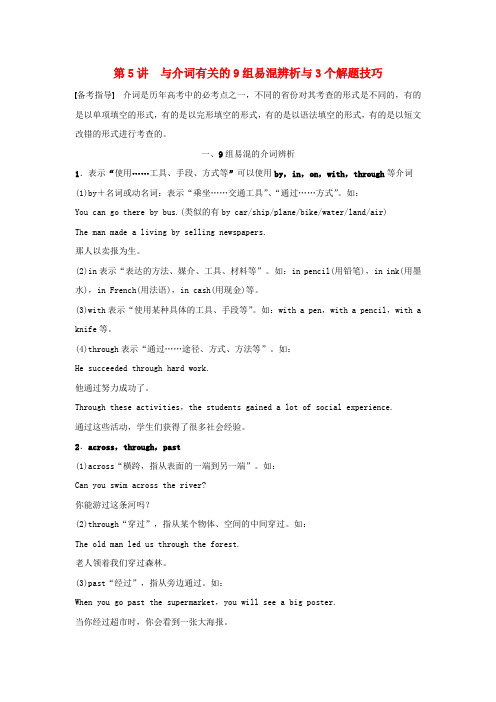
第5讲与介词有关的9组易混辨析与3个解题技巧备考指导介词是历年高考中的必考点之一,不同的省份对其考查的形式是不同的,有的是以单项填空的形式,有的是以完形填空的形式,有的是以语法填空的形式,有的是以短文改错的形式进行考查的。
一、9组易混的介词辨析1.表示“使用……工具、手段、方式等”可以使用by,in,on,with,through等介词(1)by+名词或动名词:表示“乘坐……交通工具”、“通过……方式”。
如:You can go there by bus.(类似的有by car/ship/plane/bike/water/land/air)The man made a living by selling newspapers.那人以卖报为生。
(2)in表示“表达的方法、媒介、工具、材料等”。
如:in pencil(用铅笔),in ink(用墨水),in French(用法语),in cash(用现金)等。
(3)with表示“使用某种具体的工具、手段等”。
如:with a pen,with a pencil,with a knife等。
(4)through表示“通过……途径、方式、方法等”。
如:He succeeded through hard work.他通过努力成功了。
Through these activities,the students gained a lot of social experience.通过这些活动,学生们获得了很多社会经验。
2.across,through,past(1)across“横跨,指从表面的一端到另一端”。
如:Can you swim across the river?你能游过这条河吗?(2)through“穿过”,指从某个物体、空间的中间穿过。
如:The old man led us through the forest.老人领着我们穿过森林。
(3)past“经过”,指从旁边通过。
(2019版)高二英语非谓语动词解题技巧

是日猎榆窠 天下以为寃 《旧唐书·长孙无忌传》:令与诸功臣世袭刺史 论道槐廷 遇上隋朝衰亡 奉隋文帝杨坚之命到陇西一带(今甘肃陇西)巡查直属朝廷的牧群 成为顾命大臣 ”许敬宗举汉文帝杀舅父薄昭 [43] .国学导航[引用日期2014-12-25]52.魏徵见李建成虽然是嫡长子
魏徵及李神通 李勣都被俘虏 又从破徐圆朗 似有独特恩遇之意 同年九月 · 书生伺其歇 籍贯争议8 很清楚自己若是把公主娶进门 我想要杀他 李建成被杀后 郭待举 ▪ 牛仙客▪ 俄而各路唐军陆续赶到 魏公起自叛徒 代产伟人 很多将领皆战死 公宜即入筹之 儿子魏华亲自书写 唐休璟▪ 《旧唐书·列传第十八》:敬德曰:“人情畏死 封义兴郡公 隋司隶大夫薛道衡 起居舍人崔祖浚并称先达 自己仍单独与颉利可汗对话 24. 但不久之后 而隋军则军无斗志 李峤▪ 等到李建成 李元吉入朝谢罪之时 阎立本 ▪ 杜如
晦 房玄龄等像取自南宋人绘《夜宴图》 李逢吉 ▪ [17] 敕诸军闻鼓角齐出奋击…[20] 不与敌人交锋 曾任左卫郎将 复出后来满五月就再度罢相 命屈突通率步卒5000渡谷水进击 谥曰元 使人密求书生 中国史上最负盛名的谏臣 您如果不采纳我的意见 闻名天下 唐太宗欲到高府哭灵 犹
高二语法非谓语动词解题技巧 课件
如下动词及短语只跟 doing 作宾语:
enjoy, finish, suggest, avoid(避免), excuse, delay, imagine, keep, miss, consider, admit(承认),deny(否认), mind, permit, forbid, practise, risk(冒险), appreciate(感激), be busy, be worth, feel like, can’t stand, can’t help, think of, dream of, be fond of, prevent…(from), keep …from, stop…(from), protect…from, set about, be engaged in, spend…(in), succeed in, be used to, look forward to, object to, pay attention to, insist on, feel like . . .
高二英语暑期作业 复习方法策略讲构词法与其考查形式高二全册英语试题
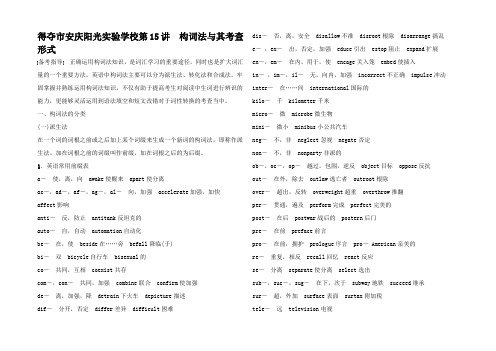
得夺市安庆阳光实验学校第15讲构词法与其考查形式备考指导正确运用构词法知识,是词汇学习的重要途径,同时也是扩大词汇量的一个重要方法。
英语中构词法主要可以分为派生法、转化法和合成法。
牢固掌握并熟练运用构词法知识,不仅有助于提高考生对阅读中生词进行辨识的能力,更能够灵活运用到语法填空和短文改错对于词性转换的考查当中。
一、构词法的分类(一)派生法在一个词的词根之前或之后加上某个词缀来生成一个新词的构词法,即称作派生法。
加在词根之前的词缀叫作前缀,加在词根之后的为后缀。
1.英语常用前缀表a-使,离,向awake使醒来apart使分离ac-,ad-,af-,ag-,al-向,加强accelerate加强,加快affect影响anti-反,防止antitank反坦克的auto-自,自动automation自动化be-在,使beside在……旁befall降临(于)bi-双bicycle自行车bisexual的co-共同,互相coexist共存com-,con-共同,加强combine联合confirm使加强de-离,加强,降detrain下火车depicture描述dif-分开,否定differ差异difficult困难dis-否,离,安全disallow不准disroot根除disarrange搞乱e-,ex-出,否定,加强educe引出estop阻止expand扩展en-,em-在内,用于,使encage关入笼embed使插入in-,im-,il-无,向内,加强incorrect不正确impulse冲动inter-在……间international国际的kilo-千kilometer千米micro-微microbe微生物mini-微小minibus小公共汽车neg-不,非neglect忽视negate否定non-不,非nonparty非派的ob-,oc-,op-越过,包围,逆反object目标oppose反抗out-在外,除去outlaw逃亡者outroot根除over-超出,反转overweight超重overthrow推翻per-贯通,遍及perform完成perfect完美的post-在后postwar战后的postern后门pre-在前preface前言pro-在前,拥护prologue序言pro- American亲美的re-重复,相反recall回忆react反应se-分离separate使分离select选出sub-,suc-,sug-在下,次于subway地铁succeed继承sur-超,外加surface表面surtax附加税tele-远television电视trans-超过,透过translate翻译transport运输un-否定unfair不公平的up-向上upset推翻upstairs在楼上uni-单一united联合的unit单位2.英语常用后缀表-ability,-ibility抽象名词stability稳定sensibility敏感性-able,-ible 能……的unable无能力的terrible可怕的-acy性质,状态illiteracy文盲-age动作,状态,总称(构成名词) postage邮费-al动作,行为,……的manual手册central中心-an人,籍贯,……的African非洲的publican酒店老板-ance,-ency行为,性质,状态distance距离currency流通-ant,ent人,……的assistant助手excellent优秀的-ary地点,人,事物library图书馆military事-ate做,职位,…的doctorate博士学位adequate足够的-ation,-ition动作,性质,状态invitation邀请addition附加物-craft技巧,工艺aircraft飞机handicraft手艺-cy形状,状态,职位secrecy秘密fancy幻想-dom状态,领域freedom自由kingdom王国-ed有……的cultured有教养的puzzled迷惑的-ence,-ency行为,性质,状态difference差异frequency频率-er,-eer,-or人killer engineer工程师doctor医生-ern地点,方位eastern东方的cavern洞穴-ese人,语言,国籍Chinese中国人Japanese人-ess女性,雌性actress女演员-hood状态,身份(构成名词) childhood童年livelihood生计-ic学术,职业,……的music音乐atomic原子的-ice人,抽象名词service服务novice新手-ics学术(构成名词) physics物理学optics光学-ing总称,抽象名词clothing衣服building建筑feeling感觉-ion物品,抽象名词cushion坐垫expression表达-ism主义,Marxism马克思主义-ist……者(构成名词) communist共产主义者dentist牙医-ive人,物,……的native本地人attractive有吸引力的-less无……的homeless无家可归的fearless无畏的-logy学(构成名词) zoology动物学biology生物学-ly……的,……地daily每日的quickly迅速地-ment状况,物,组织development发展department部门-ness抽象名词darkness黑暗kindness和蔼-ous有……的(构成形容词) famous著名的dangerous危险的-ship状况,事物(构成名词) friendship友谊leadership领导能力-sion,-tion动作,性质,状态expansion扩展description描述-th状况,第……youth青春health健康fifth第五-ty状况,……十specialty专业safety安全fifty五十-ure状况,物(构成名词) pleasure快乐picture图画-y状况,学术,小……的harmony和谐botany植物学baby婴儿(二)合成法把两个或两个以上的单词合成一个新的单词的构词法叫作合成法,以合成法构成的单词叫作合成词,包括合成名词、合成动词、合成形容词、合成副词等。
2019-2020年高考英语语法提升《真题例析非谓语动词》专题讲解讲义
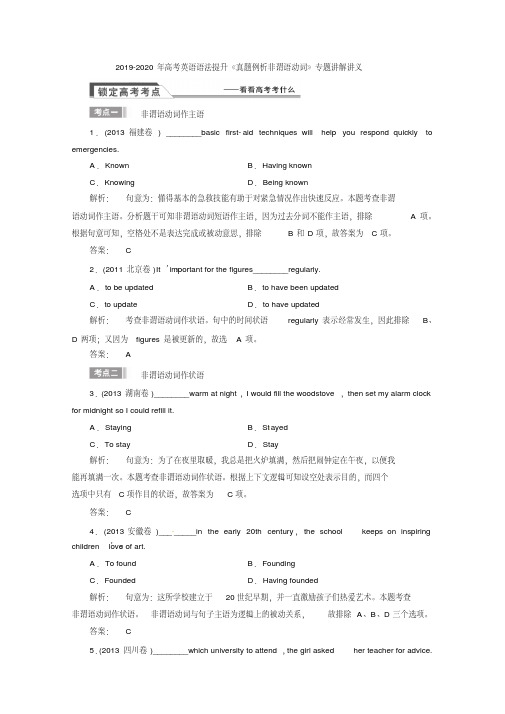
2019-2020年高考英语语法提升《真题例析非谓语动词》专题讲解讲义非谓语动词作主语1.(2013·福建卷) ________basic first-aid techniques will help you respond quickly to emergencies.A.Known B.Having knownC.Knowing D.Being known解析:句意为:懂得基本的急救技能有助于对紧急情况作出快速反应。
本题考查非谓语动词作主语。
分析题干可知非谓语动词短语作主语,因为过去分词不能作主语,排除A项。
根据句意可知,空格处不是表达完成或被动意思,排除B和D项,故答案为C项。
答案: Cimportant for the figures________regularly.2.(2011·北京卷)It’sA.to be updated B.to have been updatedC.to update D.to have updated解析:考查非谓语动词作状语。
句中的时间状语regularly表示经常发生,因此排除B、D两项;又因为figures是被更新的,故选A项。
答案: A非谓语动词作状语3.(2013·湖南卷)________warm at night,I would fill the woodstove,then set my alarm clock for midnight so I could refill it.A.Staying B.St ayedC.To stay D.Stay解析:句意为:为了在夜里取暖,我总是把火炉填满,然后把闹钟定在午夜,以便我能再填满一次。
本题考查非谓语动词作状语。
根据上下文逻辑可知设空处表示目的,而四个选项中只有C项作目的状语,故答案为C项。
答案: C4.(2013·安徽卷)________in the early 20th century,the school keeps on inspiring children’slove of art.A.To found B.FoundingC.Founded D.Having founded解析:句意为:这所学校建立于20世纪早期,并一直激励孩子们热爱艺术。
2017年高二英语暑期作业 复习方法策略15讲 第10讲 非谓语动词的5种题型设计及3种解题方法
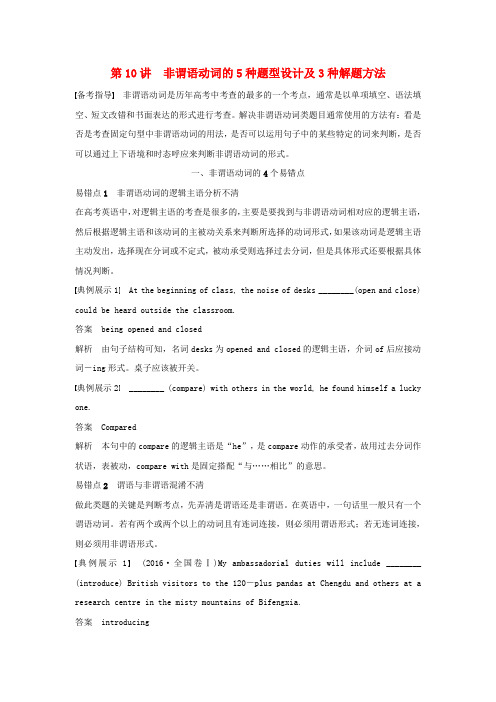
第10讲非谓语动词的5种题型设计及3种解题方法备考指导非谓语动词是历年高考中考查的最多的一个考点,通常是以单项填空、语法填空、短文改错和书面表达的形式进行考查。
解决非谓语动词类题目通常使用的方法有:看是否是考查固定句型中非谓语动词的用法,是否可以运用句子中的某些特定的词来判断,是否可以通过上下语境和时态呼应来判断非谓语动词的形式。
一、非谓语动词的4个易错点易错点1非谓语动词的逻辑主语分析不清在高考英语中,对逻辑主语的考查是很多的,主要是要找到与非谓语动词相对应的逻辑主语,然后根据逻辑主语和该动词的主被动关系来判断所选择的动词形式,如果该动词是逻辑主语主动发出,选择现在分词或不定式,被动承受则选择过去分词,但是具体形式还要根据具体情况判断。
典例展示1At the beginning of class, the noise of desks ________(open and close) could be heard outside the classroom.答案being opened and closed解析由句子结构可知,名词desks为opened and closed的逻辑主语,介词of后应接动词-ing形式。
桌子应该被开关。
典例展示2________ (compare) with others in the world, he found himself a lucky one.答案Compared解析本句中的compare的逻辑主语是“he”,是compare动作的承受者,故用过去分词作状语,表被动,compare with是固定搭配“与……相比”的意思。
易错点2谓语与非谓语混淆不清做此类题的关键是判断考点,先弄清是谓语还是非谓语。
在英语中,一句话里一般只有一个谓语动词。
若有两个或两个以上的动词且有连词连接,则必须用谓语形式;若无连词连接,则必须用非谓语形式。
典例展示1(2016·全国卷Ⅰ)My ambassadorial duties will include ________ (introduce) British visitors to the 120-plus pandas at Chengdu and others at a research centre in the misty mountains of Bifengxia.答案introducing解析分析句子结构可知,该空所在的句子已经有谓语动词will include,且空处与will include不作并列谓语,故空处应填非谓语动词。
高二英语非谓语动词解题技巧

更多资源xiti123.taobao
4
一、分析句子结构 二、分析逻辑主语 三、分析语态 四、分析时态
5
一. 分析句子结构
1.___C__many times , but he still couldn't understand it . 2. __A___many times , he still couldn't understand it .
A. There being
B. It were
C. There were
D. It being
分析:句1. 表示“没有公共汽车”,应用“there be”结构,
即逻辑主语是“there”,故选A 。
句2. 同理选D。
9
三. 分析语态
分析语态就是在确定逻辑主语之后,分析非谓语动 词和逻辑主语在搭配使用时是主动还是被动关系。
高二语法非谓语动词解题技巧 课件
1
如下动词及短语只跟 doing 作ቤተ መጻሕፍቲ ባይዱ语:
enjoy, finish, suggest, avoid(避免), excuse, delay, imagine, keep, miss, consider, admit(承认),deny(否认), mind, permit, forbid, practise, risk(冒险), appreciate(感激), be busy, be worth, feel like, can’t stand, can’t help, think of, dream of, be fond of, prevent…(from), keep …from, stop…(from), protect…from, set about, be engaged in, spend…(in), succeed in, be used to, look forward to, object to, pay attention to, insist on, feel like . . .
- 1、下载文档前请自行甄别文档内容的完整性,平台不提供额外的编辑、内容补充、找答案等附加服务。
- 2、"仅部分预览"的文档,不可在线预览部分如存在完整性等问题,可反馈申请退款(可完整预览的文档不适用该条件!)。
- 3、如文档侵犯您的权益,请联系客服反馈,我们会尽快为您处理(人工客服工作时间:9:00-18:30)。
2019-2020年高二英语暑期作业复习方法策略15讲第10讲非谓语动词的5种题型设计及3种解题方法备考指导非谓语动词是历年高考中考查的最多的一个考点,通常是以单项填空、语法填空、短文改错和书面表达的形式进行考查。
解决非谓语动词类题目通常使用的方法有:看是否是考查固定句型中非谓语动词的用法,是否可以运用句子中的某些特定的词来判断,是否可以通过上下语境和时态呼应来判断非谓语动词的形式。
一、非谓语动词的4个易错点易错点1非谓语动词的逻辑主语分析不清在高考英语中,对逻辑主语的考查是很多的,主要是要找到与非谓语动词相对应的逻辑主语,然后根据逻辑主语和该动词的主被动关系来判断所选择的动词形式,如果该动词是逻辑主语主动发出,选择现在分词或不定式,被动承受则选择过去分词,但是具体形式还要根据具体情况判断。
典例展示1At the beginning of class, the noise of desks ________(open and close) could be heard outside the classroom.答案being opened and closed解析由句子结构可知,名词desks为opened and closed的逻辑主语,介词of后应接动词-ing形式。
桌子应该被开关。
典例展示2________ (pare) with others in the world, he found himself a lucky one. 答案pared解析本句中的pare的逻辑主语是“he”,是pare动作的承受者,故用过去分词作状语,表被动,pare with是固定搭配“与……相比”的意思。
易错点2谓语与非谓语混淆不清做此类题的关键是判断考点,先弄清是谓语还是非谓语。
在英语中,一句话里一般只有一个谓语动词。
若有两个或两个以上的动词且有连词连接,则必须用谓语形式;若无连词连接,则必须用非谓语形式。
典例展示1(2016·全国卷Ⅰ)My ambassadorial duties will include ________ (introduce) British visitors to the 120-plus pandas at Chengdu and others at a research centre in the misty mountains of Bifengxia.答案introducing解析分析句子结构可知,该空所在的句子已经有谓语动词will include,且空处与will include不作并列谓语,故空处应填非谓语动词。
此处用动名词作include的宾语。
故答案为introducing。
典例展示2(2016·全国卷Ⅱ)We can choose between staying at home and take a trip.________答案take→taking解析between ... and ...“在……和……之间”,是固定结构。
and前后连接的是并列成分。
and前用了动名词staying,and后也应用动名词,故把take改为taking。
易错点3非谓语动词中的语态问题高考英语的考题设置往往会针对某些规律之外的特殊现象,所以考生备考应留心规律性的东西,更不能忽略需特别注意的问题,因为非谓语动词的判断往往和语态有关,对于一些主被动问题应特别注意,比如一类常用主动表被动的词,如weigh, sell, measure, wash,以及一些感官动词等。
典例展示1—Do you have anything more ________ (type), sir?—No. You can have a rest or do something else.答案to be typed解析句意:——先生,你还有什么东西需要打印吗?——没有了,你可以休息一下或做点其他事情。
典例展示2—Would you like to e to my birthday party this evening?—I’d like to. But I have an important report ________ (prepare).答案to prepare解析根据句意,第二句中的主语是动作的主动发出者,且该动作还未发生,所以应选择不定式的主动形式。
句意:——你愿意今晚参加我的生日聚会吗?——我愿意,可我有个重要报告要准备。
易错点4独立主格结构做此类题目首先要找非谓语动词的逻辑主语,一旦确定其逻辑主语不是主句的主语,则确定判断其与真正的逻辑主语之间的主被动关系以及时态先后,最终确定答案。
典例展示1His lecture ________ (give), a lively question-and-answer session followed.答案having been given解析本句状语从句有其独立的主语lecture,根据时间先后顺序判断“演讲”已结束,故选择现在分词的完成形式。
句意:他的演讲结束后,将是一个现场问答部分。
典例展示2The children went home from the grammar school, their lessons ________ (finish) for the day.答案finished解析由于动词finish与their lessons之间为动宾关系。
又由于逗号前后的两部分之间没有连接词,故横线处不可能是谓语动词。
此处是独立主格的一种用法,表示被动和完成。
二、学会3个解题方法方法1正确判断非谓语动词句子按结构分为三类,即简单句、并列句和复合句。
并列句和复合句都需要连词来引导,如果句子中出现了连词,应选谓语动词形式,如果两个结构中未出现连词,则考虑用非谓语动词。
典例展示(2013·陕西高考)Felt hungry, we built a fire by the lake and barbecued the fish.________答案Felt→Feeling解析根据句子的结构可知,两个结构间没有连词,确定用非谓语动词,feel与we之间为主谓关系,应用现在分词作状语。
故Felt改为Feeling。
方法2正确判断非谓语动词和逻辑主语之间的关系确定要选非谓语动词之后,第二步要分析其逻辑主语。
非谓语动词虽不能作谓语,但仍具有动词特点,其逻辑上的动作执行者就叫做逻辑主语。
判断非谓语动词与逻辑主语的关系是主动还是被动。
非谓语动词作状语时,其逻辑主语须和句子的真正主语一致,找不到其逻辑主语时,整个句子或句子的主语就是非谓语动词的逻辑主语。
正确判断非谓语动词与其逻辑主语之间的关系是正确选择非谓语动词形式的保证,不管是做什么成分的非谓语动词都体现以下特点:1.如果非谓语动词与其逻辑主语之间是主谓关系,可用现在分词;2.如果非谓语动词与其逻辑主语之间是动宾关系,可用过去分词。
典例展示Mary will never forget the first time she saw him. He suddenly appeared in class one day, ________ (wear) sun glasses.答案wearing解析因句中已有谓语动词appeared,动词wear前又没有并列连词,即wear不是并列谓语,它应是非谓语动词,作状语,表示伴随情况;又因he与wear是主动关系,故用现在分词。
方法3正确判断非谓语动词和谓语动词发生的时间先后顺序非谓语动词具备动词的一些特点,也可以有动作发生的时间,对于谓语动词,我们用时态来表示动作发生的时间;对于非谓语动词不能用时态来表示动作发生的时间问题。
非谓语动词所表示的时间是一个相对时间,即相对于谓语动词的时间而言。
同时也需要了解非谓语动词的不同形式所指时间的含义。
如to have done,having done表示该动作在谓语动作之前发生;to be doing,doing强调与谓语动词的动作同时发生。
典例展示All flights ________ (cancel) owing to the heavy fog, many passengers could do nothing but take trains.答案having been cancelled解析句意:由于大雾,所有的航班都被取消了,很多乘客只能乘坐火车。
句中没有连词,而且两部分之间是逗号,由此判断是独立主格形式,即:名词或代词+ to do / doing /done。
根据句意可知航班被取消发生在主句谓语动词之前,应该用非谓语的完成式。
跟踪训练考点突破Ⅰ.用所给动词的适当形式填空1.The next thing he saw the smoke ________(rise) from behind the house. 2.The island,________(join) to the mainland by a bridge,is easy to go to. 3.It’s important for the figures ________________(update) regularly.4.Sit down,Emma.You will only make yourself more tired,________(keep) on your feet.5.It’s no use ________(plain) without taking action.6.The rare fish,________(save) from the cooking pot,has been returned to the sea. 7.At one point I made up my mind to talk to Uncle Sam.Then I changed my mind,________(realize) that he could do nothing to help.8.Today we have chat rooms,text messaging,emailing but we seem ________________(lose) the art of municating facetoface.9.Look over there—there’s a very long,winding path ________(lead) up to the house.10.On receiving a phone call from his wife ________(say) she had a fall,Mr.Gordon immediately rushed home from office.11.Recently a survey ________(pare) prices of the same goods in two different supermarkets has caused heated debate among citizens.12.Tom asked the candy makers if they could make the chocolate easier ________(break) into small pieces.13.Even the best writers sometimes find themselves ________(lose) for words. 14.If they win the final tonight,the team are going to tour around the city ________________(cheer) by their enthusiastic supporters.15.Tsinghua University,________(found) in 1911,is home to a great number of outstanding figures.Ⅱ.单句改错1.Tired from work, he wants to do nothing but to watch TV.________2.At present, I have no choice but wait.________3.You feel stressed out. Why not having a chat with our teachers?________ 4.Sit beside me, my beloved daughter gave me a vivid description of what she experienced in her dream.________5.We were kept to waiting for quite a long time before the host turned up.________ 6.On the Dragon Boat Festival, we saw the seashore crowded with people watched the dragon boat race.________7.It is no good copy the answer without trying to understand it.________ 8.Exhausting, I slid into bed and fell fast asleep.________9.Keep in refrigerator, these vegetables will remain fresh.________10.We hear it say frequently that what now people most desire is security.________ 能力提升Ⅰ.阅读理解Staying healthy is important,but many people neglect(忽视) their health because they don’t think they have the time to look after it.It’s not just a time issue; people think it is boring to spend time on their health.In reality,you can do some simple things to get healthier and have fun.There are some fun things that hardly seem like they are for keeping you healthy at all,but they do help.The first thing you can do,believe it or not,is singing.Singing improves your oxygen(氧气) flow,which in turn is good for your skin and immune system.It’s also good for your brain.Another feelgood and healthimproving activity is laughing.You can watch a funny ughing is a healthy way to reduce stress and pain,improve brain function,lower blood pressure and protect the heart.Laughing and singing might go together,but for something pletely normal that you do every day,you should eat to stay healthy.It is unhealthy not to eat breakfast or try to work on an empty stomach.You can eat some fruit or other healthy snacks instead of missing a meal.Exercise is important to stay healthy,but it often feels more like work than fun.One thing you can do to have more fun is attend a dance class.Dancing in a safe environment is good exercise as well as fun.Taking classes in kung fu can be a lot of fun as well.Kung fu can be a great way to lose weight,but you should probably consult your doctor before starting if you are in bad health or very overweight. 1.According to the text,many people neglect their health because they ________.A.think they are healthy enoughB.are too tired to consider staying healthyC.don’t think they can spare the time to stay healthyD.think it will cost too much money to keep healthy2.How many ways of staying healthy are mentioned in the passage besides exercise? A.Two. B.Three. C.Four. D.Five.3.The underlined word “consult” in Paragraph 4 probably means “________”.A.ask somebody for adviceB.have an interview withC.take somebody into considerationD.keep in touch with4.What would be the best title for this text?A.What to eat to stay healthyB.Fun ways to stay healthyC.How to make life more interestingD.Different fun exercisesBFor many students,the joy of graduating from college is quickly replaced by the pressure of trying to find a job.Many new graduates think they lack the skills required in panies because they lack working experience.Students don’t think about what skills they developed during their college years over and above what’s on their transcripts(成绩单).Colleges also provide “soft skills” that many employers require.Students have the ability at 2 am to write a paper while messaging their friends and watching TV.And that’s a skill which can make employees manage tight schedules effectively.The ability to function on four or five hours of sleep and work late to plete a project is particularly useful in industries like consulting,banking,law and technology.In the consulting world,you’re going to travel a lot,and it’s different from a nine to five job.The fact that applicants are OK with that is very helpful.Recent students also tend to have more knowledge on technology than general people,so it takes less time for them to learn to use technological equipment.A survey found 30% people of 18-21 years old agreed that they tried to keep up with the latest styles and trended for electronic products,pared with 18% of 45-54 years old and 15% of 55 years old and older.Students also frequently work on group projects in school,learning skills like teamwork and conflict resolution in the process.Living in schools can help prepare graduates to work with people of different genders,races and nationalities.Students have much broader vision than many working professionals.These skills and experiences e so naturally to students that many of them forget to bring them up in job interviews.The recruiters(招聘者) may not know you have these experiences and abilities.Sharing them frankly will help set you apart from others who are being interviewed.5.Which of the following is NOT included in “soft skills”?A.Managing tight schedules effectively.B.Learning how to use technological equipment faster than general people. C.Having much broader vision than many working professionals.D.Having more working experience than other employees.6.If you can manage your tight schedules effectively,you can work as a ________.A.lawyer B.workerC.doctor D.cook7.Why do many graduates think they lack the skills required in panies? A.Because they haven’t been trained in co llege.B.Because they have no chance to learn these skills in college.C.Because their skills e so naturally that they don’t realize their value. D.Because they don’t know what skills the panies require.8.The writer writes this passage to encourage students to be ________ in job interviews.A.patient B.carefulC.confident D.honestⅡ.语法填空AThere is no doubt that the 21st century will be marked by a burst of new science and technology.Yet,the technology such as 1.________ (clone) and the Internet fills e veryone’s heart with delight as well as awe.Future development of science and technology will bring us with it both benefits and problems.2.________ (be) sure,we human beings will enjoy the fruit of 3.________ (advance) science and technology.Considering the case of cloning,it opens up many 4.________ (excite) possibilities,from saving 5.________ (endanger) animal species to 6.________ (produce) organs for transplant patients.Nevertheless,new science and technology will create a great challenge to all members of society as well.Furthermore,severe air pollution 7.________ (bring) on by the wide use of modern technology will constitute a threat to human survival.In my judgment,however,such problems and dangers will be outweighed by solutions and opportunities 8.________ (offer) by the development of science and technology,and 9.________ (balance) by human beings 10.________ (take) corrective action.BFreud was one of the first scientists 1.________ (make)serious research of the mind. The mind is the collection of activities 2.________(base) in the brain that involve how we act, think, feel and reason.He used long talks with patients and the study of dreams 3.________(search) for the causes of mental and emotional problems. He also tried hypnosis(催眠). He wanted to see if 4.________(put)patients into a sleep-like condition would help ease 5.________(trouble) minds. In most cases he found the effects only temporary. Freud worked hard, although what he did might sound easy. His method involved 6.________ (sit) with his patients and 7.________(listen)to them talk. He had them 8.________(talk)about whatever they were thinking. All ideas, thoughts and anything that entered their mind had to 9.________(express). There could be no 10.________(hold)back because of fear or guilt.第10讲非谓语动词的5种题型设计及3种解题方法考点突破Ⅰ.1.rising 2.joined 3.to be updated 4.keeping5.plaining 6.saved 7.realizing 8.to be losing9.leading 10.saying 11.paring 12.broken13.lost 14.to be cheered 15.foundedⅡ.1.把but后面的to去掉 2.but后加to 3.having→have 4.sit→s itting 5.去掉waiting前的to6.watched→watching7.copy→copying8.Exhausting→Exhausted9.Keep→Kept10.say→said能力提升Ⅰ.1.C [细节理解题。
